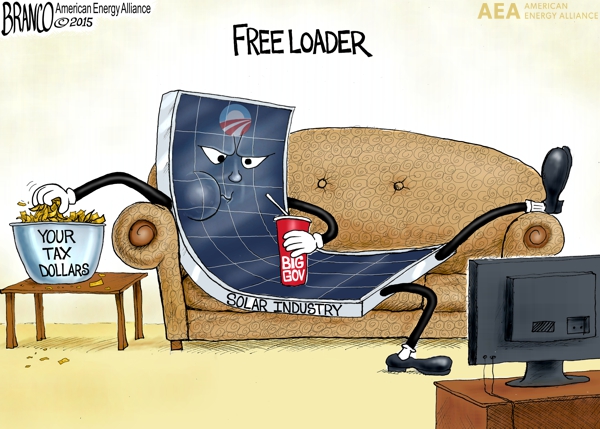Cartoon C/O American Energy Alliance
Thanks to politicians, environmentalists, and the solar industry, taxpayers and consumers are being fleeced. The federal government heavily subsidizes the solar industry, and a number of state governments have policies encouraging solar and green energy production.
The federal government subsidizes solar energy much more generously than other sources of electricity. According to a study by the University of Texas at Austin, the coal industry received federal subsidies of $1.06 per megawatt hour in 2016; the oil and natural gas industry received federal subsidies of $0.91 per megawatt hour; the nuclear industry received federal subsidies of $1.30 per megawatt hour; and the wind industry received federal subsidies of $12.74 per megawatt hour while the solar industry received federal subsidies of $61.31 per megawatt hour.
Furthermore, 29 states have enacted renewable portfolio standards, which mandate the amount of green energy that must be produced. These standards have greatly increased renewable energy production. According to the National Conference of State Legislatures, “Roughly half of the growth in U.S. renewable energy generation since 2000 can be attributed to state renewable energy requirements.” Eight other states have set renewable portfolio goals.
Another common policy used by states to increase the supply of solar energy and convince consumers to install solar panels at their homes is net metering. The Solar Energy Industries Association describes net metering as “a billing mechanism that credits solar energy system owners for the electricity they add to the grid.” 38 states have state-mandated net metering systems.
Sometimes states even require utilities to credit solar customers’ accounts for the full retail price of the power they supply to the grid. This is absurd because the full retail rate includes costs, such as overhead and grid maintenance, that solar customers do not have to worry about. Power companies – and their non-solar customers – should not be forced to purchase unneeded or unwanted power from solar customers, nor should they be forced to overpay for the power that they choose to purchase from solar customers.
Depending upon solar customers’ production and usage of electricity, net metering may even allow these customers to benefit from the grid without having to pay a dime for it. Obviously, if too many customers freeload, then there will not be enough people to pay to maintain and upgrade the grid.
Just how important are incentives for the solar industry? Without incentives, relatively few consumers would be interested in investing tens of thousands of dollars in solar panels when it is unclear if the panels will ever save them much money. For example, when incentives were dialed back in Nevada, the solar panel installation industry imploded.
Because of the intermittent nature of solar energy, reserve generating capacity is needed to supply energy to the grid whenever clouds block the sun. Otherwise, grid operators must cut power to customers or risk damage to the grid. Of course, when power companies must maintain more power plants to provide backup power, consumers are stuck with the additional costs.
Huge utility-scale solar plants often require the construction of expensive transmission lines to transmit electricity to customers because the plants are often built in remote locations. In fact, building just a single mile of a transmission line can cost millions of dollars. The money spent on these lines might well be better spent upgrading the country’s aging grid, vital parts of which are 40 to 70 years old. Depending upon which source is consulted, the grid is either in need of tens of billions of dollars or trillions of dollars of investment.
Government mandates and taxpayer-funded incentives for solar and renewable energy should be ended. After all, it is unfair to force poorer consumers and taxpayers to subsidize their wealthier neighbors’ electric bills.
Richard McCarty is the Director of Research at Americans for Limited Government Foundation.







